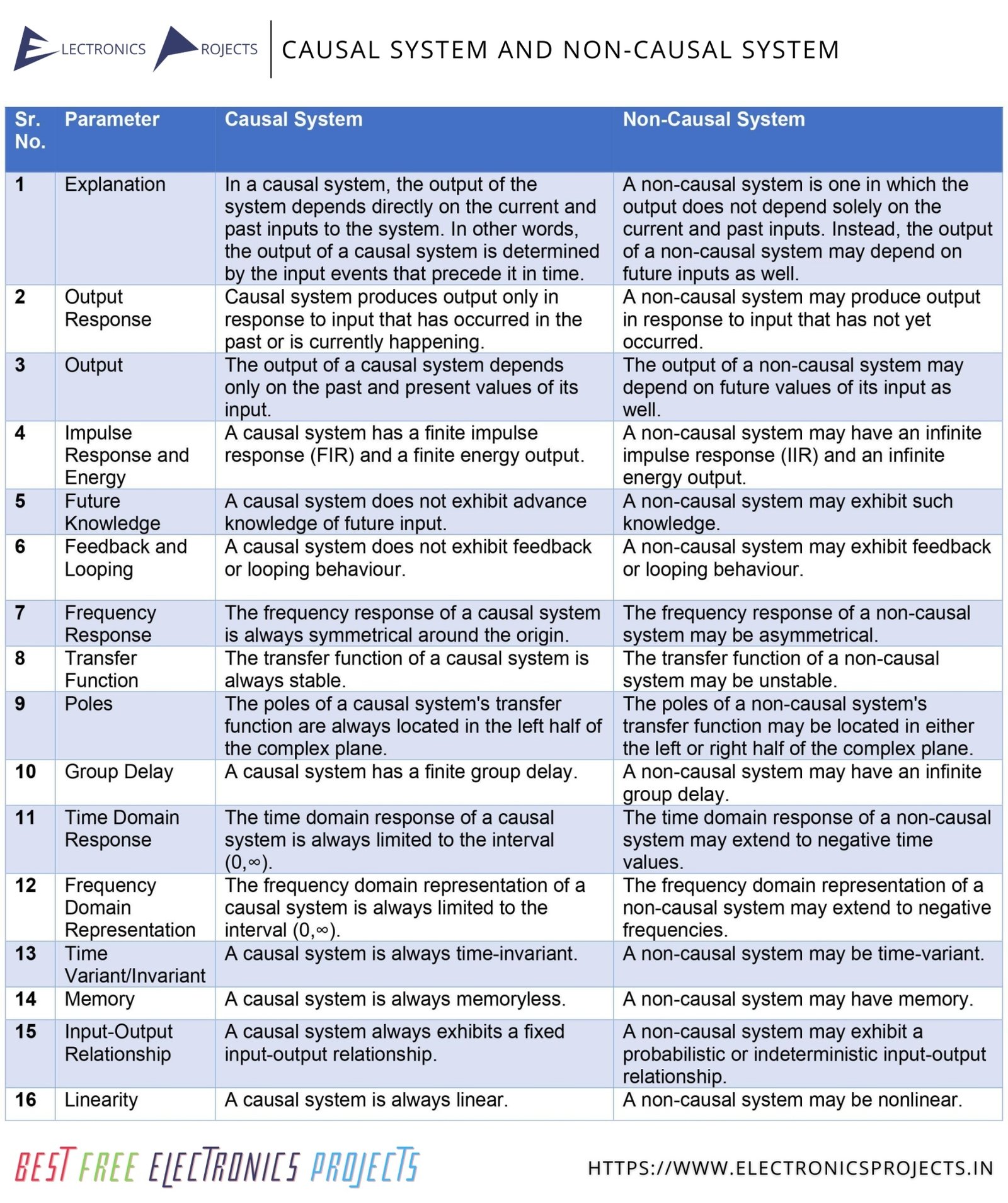What is Causal System?
In signals and systems, a causal system is a system in which the output of the system depends only on past and present input values. This means that the output of the system cannot be affected by future input values.
For example, if we have a causal system with an input x(t) and output y(t), the output y(t) at any given time t will only depend on the input values x(t), x(t-1), x(t-2), and so on, up until the initial time. It will not depend on any future input values x(t+1), x(t+2), and so on.
Causal systems are important in many fields, such as control engineering, because they are more physically realizable than non-causal systems. This is because it is generally not possible to affect the future, so it is not possible to design a system that relies on future input values in order to produce an output.
What is Non-Causal System?
In signals and systems, a non-causal system is a system in which the output of the system depends on both past and future input values. This means that the output of the system can be affected by future input values, in addition to past and present input values.
For example, if we have a non-causal system with an input x(t) and output y(t), the output y(t) at any given time t may depend on the input values x(t), x(t-1), x(t-2), and so on, up until the initial time, as well as future input values x(t+1), x(t+2), and so on.
Non-causal systems are not physically realizable, because it is generally not possible to affect the future. However, they can be useful in theoretical or mathematical analyses, as they can provide insight into the behavior of systems that do not have the constraint of causality.
Difference between Causal and Non-Causal System:
Text Version:
| SR. NO. | PARAMETER | CAUSAL SYSTEM | NON-CAUSAL SYSTEM |
|---|---|---|---|
| 1 | Explanation | In a causal system, the output of the system depends directly on the current and past inputs to the system. In other words, the output of a causal system is determined by the input events that precede it in time. | A non-causal system is one in which the output does not depend solely on the current and past inputs. Instead, the output of a non-causal system may depend on future inputs as well. |
| 2 | Output Response | Causal system produces output only in response to input that has occurred in the past or is currently happening. | A non-causal system may produce output in response to input that has not yet occurred. |
| 3 | Output | The output of a causal system depends only on the past and present values of its input. | The output of a non-causal system may depend on future values of its input as well. |
| 4 | Impulse Response and Energy | A causal system has a finite impulse response (FIR) and a finite energy output. | A non-causal system may have an infinite impulse response (IIR) and an infinite energy output. |
| 5 | Future Knowledge | A causal system does not exhibit advance knowledge of future input. | A non-causal system may exhibit such knowledge. |
| 6 | Feedback and Looping | A causal system does not exhibit feedback or looping behaviour. | A non-causal system may exhibit feedback or looping behaviour. |
| 7 | Frequency Response | The frequency response of a causal system is always symmetrical around the origin. | The frequency response of a non-causal system may be asymmetrical. |
| 8 | Transfer Function | The transfer function of a causal system is always stable. | The transfer function of a non-causal system may be unstable. |
| 9 | Poles | The poles of a causal system’s transfer function are always located in the left half of the complex plane. | The poles of a non-causal system’s transfer function may be located in either the left or right half of the complex plane. |
| 10 | Group Delay | A causal system has a finite group delay. | A non-causal system may have an infinite group delay. |
| 11 | Time Domain Response | The time domain response of a causal system is always limited to the interval (0,∞). | The time domain response of a non-causal system may extend to negative time values. |
| 12 | Frequency Domain Representation | The frequency domain representation of a causal system is always limited to the interval (0,∞). | The frequency domain representation of a non-causal system may extend to negative frequencies. |
| 13 | Time Variant/Invariant | A causal system is always time-invariant. | A non-causal system may be time-variant. |
| 14 | Memory | A causal system is always memoryless. | A non-causal system may have memory. |
| 15 | Input-Output Relationship | A causal system always exhibits a fixed input-output relationship. | A non-causal system may exhibit a probabilistic or indeterministic input-output relationship. |
| 16 | Linearity | A causal system is always linear. | A non-causal system may be nonlinear. |
Image Version:

Download above image in HD | Size: 1 MB | JPG Image
